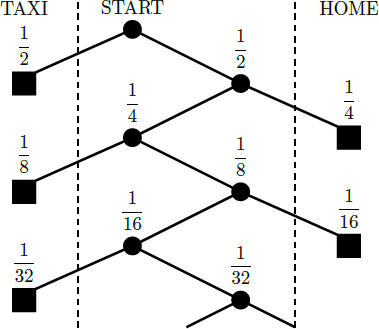Random walk
Paul has once again drunk too much and been driven home by taxi. At home, he still has steps to his doorstep. Since Paul is completely drunk, he makes a step forward (to home) with probability and a step back with probability If he gets back into the taxi (which is only one step away from cell 0 in the diagram), the taxi driver drives him directly to the next police station, so he can spend the night in the sobering-up cell.
What is the probability of Paul reaching his front door (in percent) to 3 decimal places?
Bonus problem: Solve the problem for arbitrary and .
The answer is 33.333.
This section requires Javascript.
You are seeing this because something didn't load right. We suggest you, (a) try
refreshing the page, (b) enabling javascript if it is disabled on your browser and,
finally, (c)
loading the
non-javascript version of this page
. We're sorry about the hassle.
All possible outcomes can be represented by a tree diagram The numbers indicates the probabilitiy of Paul reaching the corresponding state. Paul gets to his front door on the first try with a probability
p
1
=
4
1
, on the second try with
p
2
=
1
6
1
, and so on. For the
m
th try, the probability reads
p
m
⇒
P
=
4
m
1
=
m
=
1
∑
∞
p
m
=
4
1
m
=
0
∑
∞
4
m
1
=
4
1
1
−
1
/
4
1
=
3
1
with the help of the geometric series
∑
m
=
0
∞
r
m
=
1
−
r
1
.
The numbers indicates the probabilitiy of Paul reaching the corresponding state. Paul gets to his front door on the first try with a probability
p
1
=
4
1
, on the second try with
p
2
=
1
6
1
, and so on. For the
m
th try, the probability reads
p
m
⇒
P
=
4
m
1
=
m
=
1
∑
∞
p
m
=
4
1
m
=
0
∑
∞
4
m
1
=
4
1
1
−
1
/
4
1
=
3
1
with the help of the geometric series
∑
m
=
0
∞
r
m
=
1
−
r
1
.